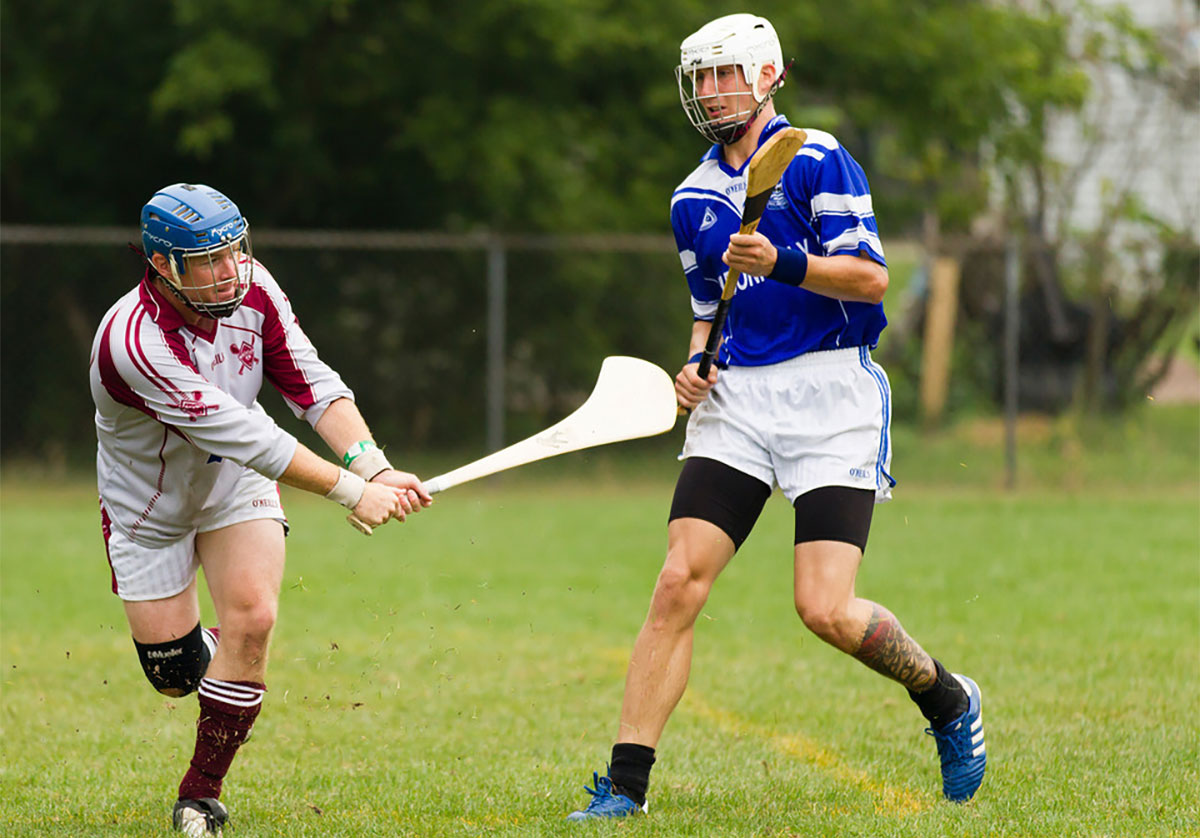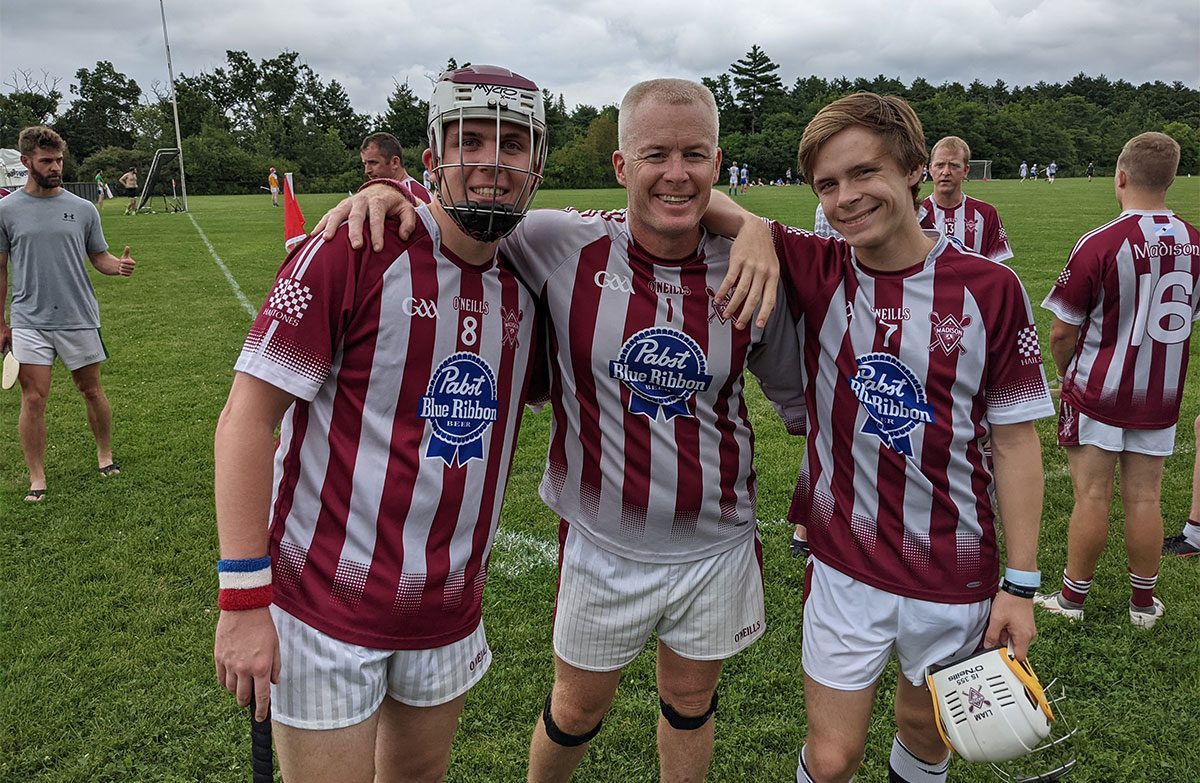
Bill Jones (left), a solo practitioner in Madison, is one of the founders of the Madison Hailstones, a club for hurling, camogie and Gaelic football.
March 15, 2023 – Think practicing law is tough, try hurling. Bill Jones, a solo practitioner in Madison, is one of the founders of the Madison Hailstones, a club for hurling, camogie and Gaelic football. He is some combination of the heart and soul of the team, the brain-trust, and the most active recruiter.
Hurling is an Irish sport, billed as the fastest game on grass. For an American, it resembles a combination of lacrosse and field hockey. Hurling is a men’s sport. Camogie is the women’s version of the game, with some rules variation.
Played on a field roughly equivalent to a soccer pitch, players score points by hitting a ball, the sliotar, either between two goals posts for one point, or into the goal below the posts for three points.
The goalie is armed with a slightly larger paddle than field players (paddles are known as hurleys) and covers the bottom goal while the defenders defend by generally pushing, slapping, knocking, and shoulder charging.
Intro to Law, and Hurling
While he seems to be surrounded mostly by hurling these days, Bill Jones grew up in Green Bay, surrounded by the law. His father was a lawyer. His brother is a lawyer. His uncle is a city attorney in Stevens Point. His cousin is a judge. Bill, however, planned on being an astronaut.
 Aaron M. Earlywine, a J.D. candidate at U.W. Law School (Class of 2023), is a contributing writer for the State Bar of Wisconsin. He can be reached at
earlywine@wisc.edu or at (347) 515-0933, and is always looking for leads.
Aaron M. Earlywine, a J.D. candidate at U.W. Law School (Class of 2023), is a contributing writer for the State Bar of Wisconsin. He can be reached at
earlywine@wisc.edu or at (347) 515-0933, and is always looking for leads.
He studied mechanical engineering and astronautics, graduating from U.W.-Madison in 1992. With the end of the Cold War however, NASA was downsizing.
So Bill took a manufacturing job in Stillwater, Minnesota, for two years before he got caught by another, albeit unrelated, bout of downsizing and was forced to regroup back in Green Bay.
Bill’s younger brother was already attending U.W. Law School and convinced Bill to give the legal world a shot. He attended the University of Tulsa College of Law.
He credits his interest in criminal defense to a professor, and his interest led him to work for the Dane County District Attorney’s Office in 2002.
By 2006, Bill had started his own defense firm, choosing to operate out of a home office. His best piece of career advice: “keep your overhead low and you can do whatever you want.”
In the mid-2000s, Bill was years ahead of the game when he elected to work from home. “I’m too efficient at home to go to an office,” he contends.
Still, as a matter of comfort or as a matter of necessity to keeps costs down, Bill acknowledged that working from home did carry a stigma until recently.
Bill finds his clients through word-of-mouth referrals or federal and state appointments. His home office, however, is just for him, and he interacts with his clients through video or over the phone.
Or he goes to them. Bill suggests that not having a traditional office has actually helped his practice and client relations. “They like that. People don’t want to go to a lawyer’s office and be seen in that [environment],” Bill says of his clients.
“People run into trouble, and they need their story told,” he explains, “[but] people are scared, confused, and embarrassed.”
As a criminal lawyer, and given the nature of the business, Bill suspects that a certain degree of anonymity and the very limited exposure his small business model provides are a great relief to his clients during a stressful time and process.
Yet, at age thirty with his solo practice established and growing, Bill found he was still “seeking something, anything to do.” On St. Patrick’s Day, 2007, a chance encounter answered his plea, and for Bill “it was a godsend to have this come into my life.”

Bill Jones (center) with his two sons, also hurling enthusiasts.
Here Come the Hailstones
In 2007, after the St. Patrick’s Day parade, Bill spied two men hitting a sliotar on the capital lawn. He had grown up in an Irish-Catholic household and had heard of hurling in his youth, although he’d never played himself.
He approached them and in short order was informed by one of the men, Jason Kenny, that they intended to start a hurling club in Madison.
Bill was in from the get go. The first practice as scheduled for March 24th, over by Picnic Point. It was the Kenny brothers, Bill, and one other guy.
Humble beginnings to be sure. Still, after practice Bill went home and told his wife, “I think this is a sport I’ve been practicing my whole life for.”
For the nascent club, things were touch and go for a long while. “We had no one to play and nowhere to play,” Bill recalls. And they had no name at first.
Later that year, however, the usual suspects, all four of them, were sitting in their cars. They had agreed to practice every Tuesday at Memorial High School.
But that day it was raining torrentially. And then it started to hail. The name wrote itself, although in team lore Tom Eisenhower is credited with the moniker.
In 2008, with roster numbers approaching something akin to a viable team, the newly christened Hailstones invited teams from Milwaukee, Chicago and Minneapolis out for a tournament in Madison, held in Olbrich Park, right on the shore of Lake Monona.
The now yearly tournament was enshrined the Midwest Tournament, because admittedly, “we didn’t know what else to call it.” In 2011, the Hailstones joined the North American County Board, later known as the USGAA.
2013 was the watershed year. The Hailstones, defying expectations, faced Milwaukee in the finals of the 2013 National Tournament in Cleveland. “It was one of the greatest games I’ve ever played in,” Bill reminisced, although the Hailstones came up short in overtime.
From that lofty vantage point, it has still been mostly up for the club, which won the national championship for their division in 2015, 2019, 2021, and 2022 – as well as a trophy case full of tournament championships and sometimes even concurrent national championships across different divisions and different sports for their Gaelic Football, Ladies Gaelic Football, and Camogie squads.
“We’re the best club in the country,” Bill said emphatically, “and you can quote me on that.” Bill has been a critical catalyst for this success. He organizes, recruits, and builds the culture that pays dividends come match day. And he fittingly plays goalie. Because in sports and in life, the best defense is a great attorney.
Bigger Pictures
When asked what issues are facing the criminal justice system on both sides of the aisle, Bill highlighted problems of access and availability.
“Dodge County does not have a DA” he noted at the time, referencing a dearth of prosecutors and defenders in Wisconsin that has made headlines in recent months.1
Even when representation is available, Bill finds the current environment frustrating at times. “People aren’t talking to defense attorneys about what’s going on,” Bill said.
“Luckily, in both the federal and state system we still have really good judges. Every judge I find myself in front of, I walk out feeling they are doing their best to apply the law, no matter what court,” he noted.
On the field, the issue facing the legal community is getting lawyers … well, on the field. The State Bar of Wisconsin has already reported on the health benefits associated with time off and vacations.2
But getting out of the office, exercising, and simply being a part of a team during the work week is important to a lawyer’s wellbeing as well – especially at a time when the profession is experiencing an increase in feelings of isolation.3
The benefits of sports and the camaraderie that come with them are legion, well-documented, and well-known.4 So skip the zoom happy hours, grab a hurley, and find Bill Jones. You’ll be glad you did.
Hurling: Competition in the U.S.
An ancient sport in Ireland, Hurling’s earliest recorded games in North America were played in Newfoundland in 1788 and the sport followed the diaspora to American cities such as New York, Chicago, Boston, Philadelphia and San Francisco.5
Hurling in the U.S. is governed by the U.S. Gaelic Athletic Association (USGAA). There are ten divisions, with Philadelphia and Chicago notably getting their own dedicated divisions in the eponymous Philadelphia Division and the Central Division, respectively.
Most of the geographical U.S. is covered, with a notable exception being Utah and Nevada which are circumvented by the Western, Southwestern, and Northwest Divisions.
Endnotes
1https://www.wispolitics.com/2023/state-bar-warns-attorney-shortage-could-lead-to-constitutional-crisis
2https://www.wisbar.org/NewsPublications/WisconsinLawyer/Pages/Article.aspx?Volume=95&Issue=8&ArticleID=29314
3https://www.law.com/americanlawyer/2021/05/03/lawyers-were-already-struggling-with-stress-and-isolation-and-the-pandemic-has-made-things-much-worse/
4https://www.ncbi.nlm.nih.gov/pmc/articles/PMC6572041/
5http://usgaa.org/history/
